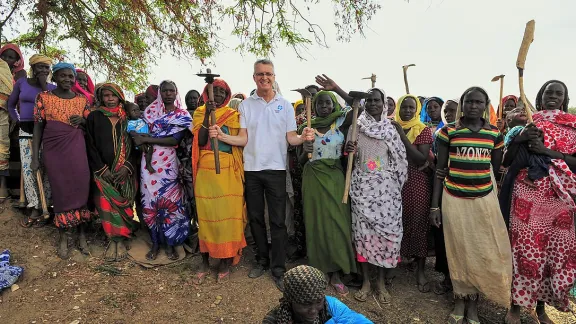
LWF General Secretary Martin Junge with farmers in a Seeds for Solutions garden in Eastern Chad. Photo: LWF/A. Danielsson
LWF Chad program helps farmers reap tons of fresh produce from bare farmland
(LWI) – During his visit to Chad last week, The Lutheran World Federation (LWF) General Secretary Rev. Dr Martin Junge met refugee and host community members working together in the “Seeds for Solutions” initiative. The LWF country program in Chad has been implementing the initiative since 2014 in partnership with the United Nations High Commissioner for Refugees and the United States Bureau of Population, Refugees and Migration. “The Seeds for Solutions achieves many purposes at once: enhances food security in the community, integrates refugees and their host community socially and economically and contributes to peace building,” he said.
Junge visited the Djabal refugee camp, which has nearly 20,800 refugees, and Koutoufou village, with over 4,270 inhabitants, as well as the community of Goz Beida. He witnessed firsthand how Seeds for Solutions empowers refugees, internally displaced people and host community members to become self-reliant and improve their livelihood by working together. This is done by securing access to farming land, teaching agricultural techniques and providing seeds, vaccinations for animals, offering vocational training and providing small loans to set up viable and sustainable businesses. The goal of the project is to support refugees and host communities to work together and become self-reliant, so they do not depend on food distribution.
Fatna Khatir Abdallah is one of the beneficiaries of the initiative in eastern Chad. Thanks to Seeds for Solutions, the mother of seven can look towards a brighter future, in which she no longer depends on humanitarian assistance. “Thank God, even if I don’t get support anymore, I can run my own business of selling animals and vegetables, and meet my own needs."
“Seeds for Solutions achieves many purposes at once: enhances food security in the community, integrates refugees and their host community socially and economically and contributes to peace building.”
4,027 hectares producing 3,786 tons of vegetables and nuts
In 2016 the project targeted a total of nearly 4,000 farmers, out of who 1,900 were refugees and the remaining from the host communities. Through the project 4,027 hectares of farmland have been made available to grow peanuts, sorghum, onions and garlic. The farmland has been protected with a fence and equipped with a solar-powered watering system. The outcome in 2015 was a harvest of 3,786 tons of vegetables and nuts which benefited the refugees and host communities. Farmers consumed 68 percent of the harvest and generated an income of USD 741,347 by selling the remaining. Another result of the project is the conversion of arid land into arable land, which in turn contributes to food security for the refugees and host community.
One uniqueness of the Seeds for Solution project is that the local community provides land which it jointly farms with the refugees, says Adamou Koumanda, LWF Chad Country Representative. “We deeply appreciate the role of the local authorities, who provide land despite scarce resources,” he adds.
Susan Muis, LWF World Service regional program coordinator for Central Africa, said the visit “showed the reality on the ground and gave good insight into the situation of Chad and the work of LWF in the country.”
Connecting humanitarian and development work
Junge praised this “innovation that connects humanitarian and development work. It offers an important perspective on dealing with the challenge of protracted refugee situations in Chad. Refugees and local people benefit from a developmental improvement for the community. I want to explore how we can replicate that elsewhere.”
He was also impressed by how the project was strongly rooted in the local community. “The reception in the village of Koutoufou was overwhelming: hundreds of villagers came together, including the local chief and authorities. That reception revealed the deep roots of the initiative in the community, roots of meaning and transformation among the population. These are indeed Seeds for Solutions.”


